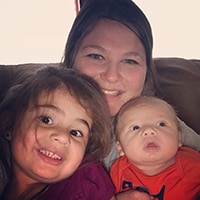Cancer Prevention Starts in Childhood

“I am a survivor of a vaccine-preventable cancer,” says Kristina. “I had the chance to prevent my cancer. Please don’t miss your chance. Vaccinate your children.”
You can lower your children’s risk of getting cancer later in life by getting them vaccinated against HPV and helping them make healthy choices.
When Kristina had a routine Pap test in 2014, at age 34, she was also tested for HPV for the first time. Human papillomavirus (HPV) is a common virus that is passed from one person to another during sex. It can cause cervical and other kinds of cancer.
“I received a call from my gynecologist reporting that my Pap was normal but that she had found HPV-16,” Kristina says.
Her gynecologist did a colposcopy to look for any abnormalities. “I will never forget the phone call from my doctor,” Kristina says. “She told me, ‘I was really surprised, but we did find cancer.’ My life came to a screeching halt. I was devastated.”
Kristina was referred to an oncologist for a hysterectomy. “The whole process involved agonizing periods of waiting for results,” she says, and it took a toll on her marriage. “I am lucky to have a very supportive husband, but this was very difficult for him as well. Until he researched the virus himself, my husband didn’t realize how prevalent HPV was and that you can harbor the virus for years without symptoms,” she says.
“I am a survivor of a vaccine-preventable cancer. I share my story daily with young women and parents who may not realize how HPV relates to them or their child.
“My message is this: I had the chance to prevent my cancer. Please don’t miss your chance. Vaccinate your children.”
Get Your Kids Vaccinated Against HPV
The HPV vaccine protects against the types of HPV that most commonly cause cancer. Both boys and girls should start and finish the HPV vaccine series when they are 11 or 12 years old. Teen girls and young women through 26 years, as well as teen boys and young men through 21 years, who haven’t started or finished the series should get those shots as soon as possible. The HPV vaccine can be given beginning at age 9.
Talk to Your Kids About Tobacco Use and Cancer
The best way to prevent cancer caused by tobacco use is for kids to never start. Most people start smoking during adolescence. Nearly 9 out of 10 cigarette smokers first tried smoking by age 18, and 98% by age 26.
In 2017, about one of every five high school students reported using a tobacco product in the last 30 days. About one in eight had used an electronic cigarette, and about one in 12 had smoked a cigarette. Talk to your children about why you don’t want them to use tobacco.
Smoke from other people’s cigarettes (“secondhand” smoke) can cause lung cancer. There is no safe level of secondhand smoke for nonsmokers. Don’t expose your children to secondhand smoke. Take the first steps to quit smoking: call 1 (800) QUIT-NOW (784-8669) for free support and visit smokefree.gov.
Stay Safe in the Sun
Just a few serious sunburns can increase your child’s risk of skin cancer later in life. Follow our sun safety tips to protect their skin from the sun whenever they’re outdoors.
Indoor tanning and tanning outside are both dangerous. Don’t let your children or teens tan.
Help Kids Keep a Healthy Weight
The number of children with obesity has continued to rise over the past two decades. Children with obesity are more likely to have obesity as adults. This can lead to physical and mental health problems. For example, adult obesity is associated with a higher risk of type 2 diabetes, heart disease, and many types of cancer. See Tips for Parents for ideas to help your children maintain a healthy weight with healthy eating habits and regular physical activity.



































No hay comentarios:
Publicar un comentario